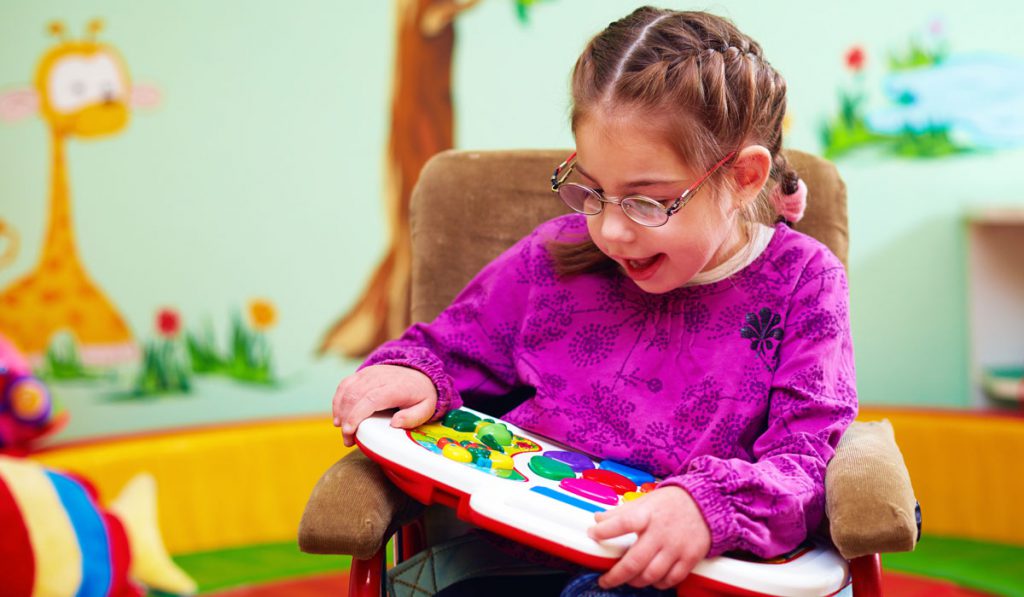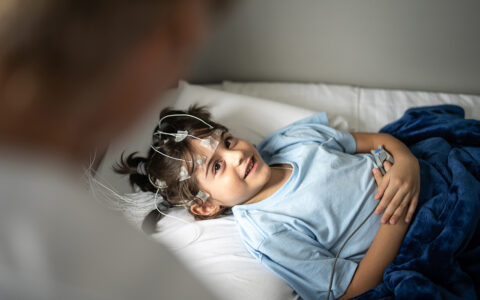Rett syndrome is a genetic neurodevelopmental disorder that afflicts approximately one in 10,000 females in the United States and, very rarely, males. It is characterized primarily by regression in hand skills, spoken language and ambulation and the development of repetitive hand movements and seizures, beginning at around two years old.
Trofinetide, a partial synthetic analog of insulin-like growth factor 1, offers a beacon of hope for families of children with Rett syndrome and their physicians, who have not had a weapon in the fight. After demonstrating the capacity to reverse Rett syndrome in animal models, trofinetide has now shown efficacy in human trials.
“Phase 2 demonstrated the efficacy of the drug in a younger population, with higher doses and over a longer exposure,” said Jeffrey Neul, M.D., a pediatric neurologist at Vanderbilt University Medical Center. Neul was primary investigator on the trials in partnership with researchers at Baylor College of Medicine, University of Alabama, Birmingham and other U.S. sites.
“If we see more robust effects in the longer phase 3 trial, which has just begun, our hope is that we may at last have a drug available to our patients that slows, or significantly modifies the disease course.”
Global Improvements Found
The phase 2 trial tested trofinetide in children using three doses over 42 days, demonstrating greatest improvement at the highest dose. In the double-blinded, placebo-controlled study, 82 children ages 5-15 were assigned 1:1:1:1 to twice daily doses of placebo or 50, 100 or 200 mg/kg of trofinetide. Over the first 14 days both groups received placebo, followed by 42 days of trofinetide for the treatment cohorts, for a total of 56 days.
“Some patients were breathing better, some were walking better, some had improved mood or were using their hands better.”
While statistically significant gains were not found along any one singular parameter like hand movement or speaking, patients’ improvements aggregated to a level of significance in global assessment. “Some patients were breathing better, some were walking better, some had improved mood or were using their hands better,” Neul said.
Researchers found a correlation between drug level and magnitude of improvement, with patients on 200 mg/kg of trofinetide demonstrating significant symptom improvements along three of the five core efficacy measures, that included validated scales and questionnaires. Twenty percent of patients taking the highest dose crossed the “full responder” threshold, Neul said. Collectively, patients experienced improvements in breathing and ambulation, and reduction in repetitive movements, mood dysfunction, disruptive behavior and seizures.
While drug and placebo groups were similarly symptomatic at 21 days, from that point the groups diverged rather sharply. Improvements fell off once the drug was stopped.
Hope for Symptom Reversal
Although Rett syndrome is a genetic disease, it is usually not heritable. It likely occurs through random mutations during spermatogenesis. It is usually not diagnosed until the child undergoes regression, and in some cases it may be misdiagnosed as cerebral palsy or another neurodevelopmental disorder, Neul explained.
“Even though Rett syndrome is as common as phenylketonuria, which every baby in the U.S. is tested for, no one is tested at birth for the Rett syndrome because currently we have no disease-modifying treatment; rather we can only provide symptomatic management.”
Trofinetide could change this. The questions become: one, what if Rett syndrome is caught early and two, what if the drug is administered over many months or years? A longer phase 3 trial is an opportunity to further test this theory.
“It may take time for Rett syndrome patients to recover or gain these abilities.”
“Based on our current understanding, it may be that this drug allows the overall neural circuitry to start working better, reinforcing the right sort of pathways and not enforcing the wrong ones,” Neul said. “Just as it takes time for a normally developing child to build motor and neurological skills, it may take time for Rett syndrome patients to recover or gain these abilities.”
Longer treatment will hopefully provide better insight into how restorative this drug may be.






